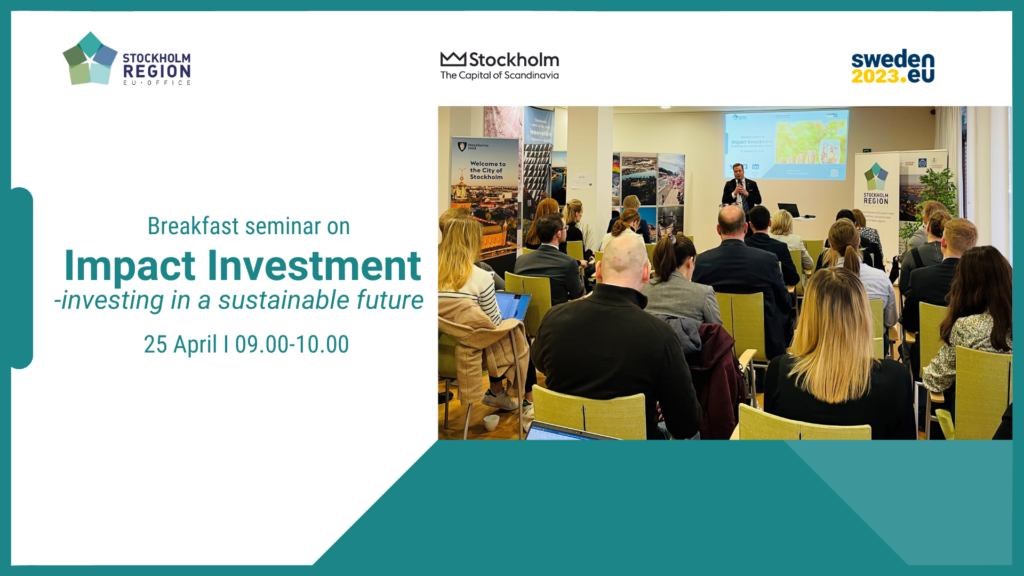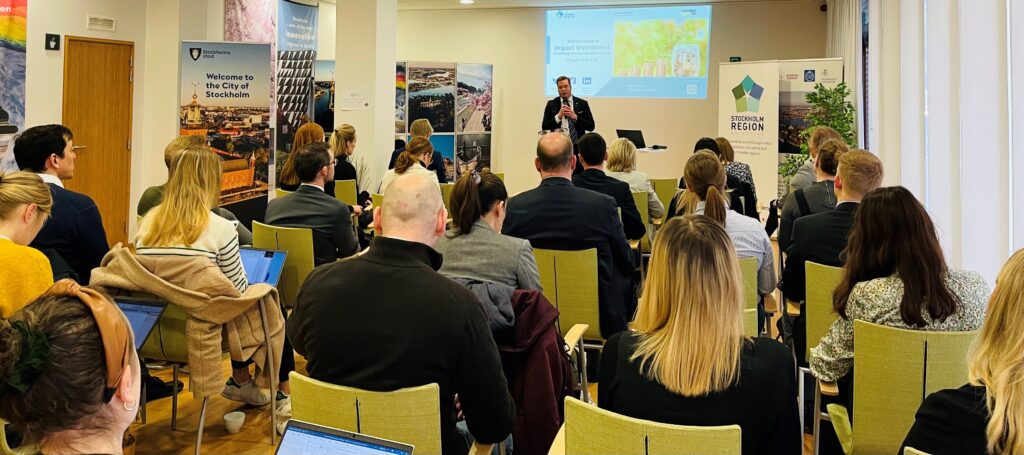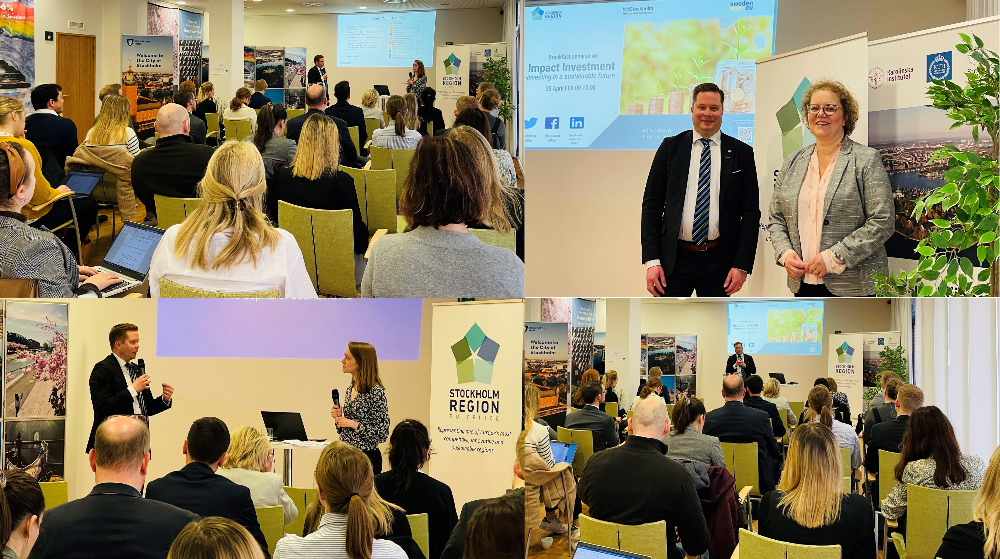
On 25 April, Stockholm Region EU Office in collaboration with Stockholm Business Region and Invest Stockholm, hosted a breakfast seminar focusing on the strategy of impact investment and in particular on how to invest in a sustainable future.
(Se svensk version nedan)
Background
The breakfast seminar is the second seminar that we organize during the spring in connection to the Swedish presidency in the European Council. It is organised together with Stockholm Business Region is a company owned by the City of Stockholm, under which Invest Stockholm is a subsidiary. Invest Stockholm is the official investment promotion agency of the city and responsible for promoting and developing Stockholm as a business destination.
As one of the EU’s 100 climate neutral and smart cities, Stockholm strives to lead by example with its high ambitions when it comes the green and digital transition. The city of Stockholm aims to become a fossil-free and climate-positive city by 2040 and the region of Stockholm aims for net zero emissions by 2045. In order to achieve these goals collaboration with other actors such as academia and companies is needed. The greater Stockholm region has one of the world’s most innovative startup ecosystems and it has been experiencing an increase in investors that want to invest sustainably. Therefore, the city aims to become a home for impact unicorns, investment, and startups.
The seminar
The guest speaker Mr. Erik Krüger, Head of Investment and Establishments at Invest Stockholm, shared best practices and challenges in the city and region of Stockholm regarding impact investment, a concept which aims to create a positive environmental and social impact as well as financial returns for a company.

Mr Krüger shed light on the strategy of Impact investment, which purpose is to create financial return as well as a positive impact on the environment and society. An important factor is the business model of impact startups, which are companies that fulfil one or more of UN:s 17 Sustainable Development Goal (SDGs). Some example given were; poverty, education, health, clean energy, climate action, etc. Therefore, the business model is based around making a positive impact in one of these areas, as well as making financial gains. Furthermore, closely linked to the concept of impact investment is the fairly new concept of impact unicorns, which are fast growing enterprises that have a positive impact on more than one billion people.
Mr Krüger underlined the importance of Stockholm region’s ecosystem, which allows for impact investment to thrive. The strength of Stockholm region is that the ecosystem is open for all stakeholders that want to be a part of the green transition, a strategy that has been developed over a long time historically. Invest Stockholm has been a core part in supporting the ecosystem by bringing together investors and companies. For example, Stockholm region has attracted plenty of investors, brings different stakeholders together and has access to world class universities. All of which simplifies the possibility to start a business in Stockholm. Another important contributing factor to the success of the ecosystem, are innovation hubs. Mr Krüger showcased two examples, that are focusing on impact investment and startups; Sting and Norrsken. These investors are focusing on innovative solutions and good business models that impacts society.
Please find the presentation here.
Discussion
During the seminar some issues were discussed, such as the lack of a universal standard and definition for both impact investment, as well as impact unicorns. The difficulty regards measuring the actual impact by a product and also to what extent the environment or the society is affected. A concrete example that Mr Krüger addressed was the company Northvolt, that create car batteries and hence contributes to the productions of electric car fleets, which has a positive impact on the environment. The difficulty lies within measuring the impact on the environment, as well as on the quality of life for people. Therefore, at the moment it is up to every company to assess the impact of a product. Although the future will bring new developments, and EU-initiatives such as the EU taxonomy is supporting the development by creating a concrete framework.

Another important factor for succeeding with impact investment that was discussed, regarded having the right skills and competences to carry out the investments. Mr Krüger underlined that in order to have successful companies that want to create an impact, the universities and private companies play a crucial role. Education is crucial for creating the right talent, knowledge and also to develop related research projects. Mr Krüger highlighted that the quality of Stockholm’s universities, in particular Royal Institute of Technology, Karolinska Institute and Stockholm University, are one of the reasons for the success of Impact Investment in Stockholm. The importance of skills as a contributing factor to the success of impact investment, aligns well with EU’s thematic focus for 2023; the European Year of Skills, which aims to create a lifelong learning that contributes to the green and digital transition.
Other breakfast seminars
Breakfast seminar on Health Data – 7th of March 2023
/Rebecca Timm, Strategic Communicator och Mikael Eliasson, trainee at Stockholm Region EU Office
Den 25 april anordnade Stockholmsregionens Europakontor tillsammans med Stockholm Business Region och Invest Stockholm ett frukostseminarium gällande “impact ivestment” och mer specifikt hur man investerar i en hållbar framtid.
Bakgrund
Stockholm Business region är ett företag som ägs av Stockholm stad där Invest Stockholm är ett dotterföretag. Invest Stockholm främjar investeringar i staden samt utvecklar Stockholm till ett attraktivt företagsklimat.
Stockholm är en av EU:s 100 klimatneutrala och smarta städer och strävar efter att vara i framkant i den gröna och digitala omställningen. Målet för Stockholm stad är att vara fossilfri och till och med klimatpositiv år 2040 och regionen strävar efter att nå nollutsläpp till år 2045. För att uppnå dessa mål krävs samarbete med andra aktörer som exempelvis företag och lärosäten. Stockholmregionen har skapat ett av världens mest innovativa startup-ekosystem vilket har attraherat investerare som vill fokusera på förnybart. Stadens mål är att impact unicorns, investeringar och startups ska etablera sig i staden.
Seminarium
Gästtalaren Erik Krüger, avdelningschef för investeringar och etableringar på Invest Stockholm, delade med sig av lärdomar och utmaningar från Stockholmsregionen gällande så kallade “impact investments”. Konceptet innebär att skapa en positiv påverkan för miljön eller socialt samtidigt som företaget genererar ekonomisk avkastning.
Krüger förklararede att impact investment innebär att företag uppfyller ett eller flera av FN:s 17 hållbarhetsmål. Exempelvis fattigdom, utbildning, hälsa, ren energi, osv. Därför baseras affärsmodellen både på en positiv inverkan inom ett eller flera av dessa områden samtidigt som företaget gör ekonomiska vinster. Ett närliggande begrepp till impact investment är det relativt nya konceptet “impact unicorns,” vilket innebär att ett sådant företag har en positiv påverkan på mer än en miljard människor.
Krüger underströk vikten av Stockholms ekosystem som en bidragande faktor till att investeringar kan frodas i regionen. Stockholmregionens styrka kommer från en långvarig strategi om ett öppet ekosystem för alla intressenter som vill vara delaktig i den gröna och digitala omställningen. Invest Stockholm har varit en central del i att stödja ekosystemet genom att föra samman investerare och företag. Exempelvis har Stockholmsregionen attraherat många olika investerare, samt har tillgång till universitet i världsklass. Det förenklar möjligheten att etablera företag i Stockholm. En annan bidragande faktor för ekosystemets styrka enligt Krüger är innovations hubar, vilket exemplifierades med Sting och Norrsken som fokuserar på innovativa lösningar och bra affärsmodeller som påverkar samhället positivt.
Presentation går att hitta här.
Diskussion
Under seminariet diskuterades flertalet frågor, till exempel avsaknaden av en universell standard och definition av impact investment och impact unicorns. Svårigheten är att mäta den faktiska påverkan av en produkt samt dess inverkan på miljön eller samhället. Krüger gav ett konkret exempel från företaget Northvolt som producerar bilbatterier vilket ökar mängden elbilar samhället vilket har en positiv effekt på miljön. Svårigheten ligger i hur man ska mäta både påverkan på miljön samt hur det påverkar livskvalitén för människor. Framtiden kommer dock utveckla nya processar och definitioner, EU:s taxonomi är exempelvis ett steg i rätt riktning att skapa ett konkret regelverk.
En annan viktig faktor för att lyckas med impact investments är att ha rätt kompetens och förmågor för att genomföra investeringarna. Krüger konstaterade för att skapa en framgångsrik positiv påverkan krävs både universitet och privata företag. Här spelar utbildning en avgörande roll för att utveckla rätt kompetens och i slutändan skapa givande forskningsprojekt. I diskussionen lyftes även universitet i Stockholm fram som en viktig del i framgången kring impact investment, i synnerhet Kungliga Tekniska Högskolan, Karolinska Institutet och Stockholms universitet. Att kompetensens är en central faktor ligger även väl i linje med EU:s fokus för 2023 som har utnämnts till Europaåret för kompetens, som syftar till att skapa ett livslång lärande och bidra till den gröna och digitala omställningen.
Andra frukostseminarier
Frukostseminarium om hälsodata – 7:e mars 2023
/Rebecca Timm, Strategisk kommunikatör och Mikael Eliasson, trainee på Stockholmsregionens Europakontor i Bryssel